By Morf Morford, Tacoma Daily Index
We Americans have always defined ourselves, and taken pride in our system of government that is, literally, of, by, and for the people.
The results have not always been as many of us might have intended – or preferred, and our system is, at times, on the messy side.
But, for better or worse, it is who we are.
Like every democratic republic, from ancient Athens to modern Scandinavian states, we have placed in office at least our share of buffoons, grifters and nitwits.
But, even those miscreants and manipulators, chosen and (all too often) elected by us, in their own way represent us – and our political system.
A few years ago I was teaching a class and I described our political system as a “liberal democracy”.
One astute and well-informed student immediately objected by saying, “No, we aren’t. We are a conservative republic”.
This is what we teachers call “a teachable moment”.
This is the point where everyone is paying attention and both positions have historical and logical merit and evidence.
Both terms (“liberal democracy” and “conservative republic”) require precise and specific definition.
As a term, “liberal democracy” refers to a democratic system of government in which individual rights and freedoms are officially recognized and protected, and the exercise of political power is limited by the rule of law. In short, a system of public accountability for government officials and protected freedoms for the citizens.
The word “democracy” refers to the rule by “the people” (from the Greek word demos) as opposed to the opposite, which is an inherited throne by king or pharaoh or dynasty of oligarchs.
In a true democracy, every citizen has the right to vote, and with very few exceptions, any citizen can run for office – and, in theory at least – be elected by a consortium of their peers and fellow citizens.
This is, at least since World War II, the dominant political system around the world.
A “republic”, at least historically, has referred to a political system not controlled by a throne or ruling family.
As one dictionary put it, a republic is “a state in which supreme power is held by the people and their elected representatives, and which has an elected or nominated president rather than a monarch”.
In other words, a “republic” is a form of government in which there is no king or queen, the power of government and law-making are given to one or more elected representatives (a president, members of a parliament or congress ).
The United States, for example, is a republic – the United Kingdom is not.
As a footnote, we in the USA are defined and recognized as “citizens”. In the UK, residents are legally defined as “subjects”.
Citizens are, by birthright or by a legal process, equal, with none having hereditary rights superior (or inferior) to others.
These “rights” extend across many areas from ownership to freedom of expression and enterprise – but few, if any, are more important than the right to vote.
I know people who say that the Second Amendment makes all the other rights possible.
I’d have to disagree; it is the right to vote that makes all other rights (including gun ownership) possible – and legitimate.
Force and threat are the tools (and standard mechanisms) of tyranny and dictatorships.
Trust and cooperation are the foundations of a stable political (and social) system.
As you may have noticed, “republic” and “democracy” are, in fact, almost synonyms; they both refer to the idea of government being by, for, and to the benefit of the people.
We may not always live up to it, but our system, whichever word we use, is still revolutionary.
And fragile.
If you don’t vote, those people will
The first principle for every citizen is to vote, because, if our voice is not heard (or counted) those we disagree with may be making their presence known and, because of our reluctance, making an undue (and not proportional) influence on our communities and identity.
History, and the rest of the world, will for better or worse, define us in terms of those we, with our freedom, have chosen to represent us.






